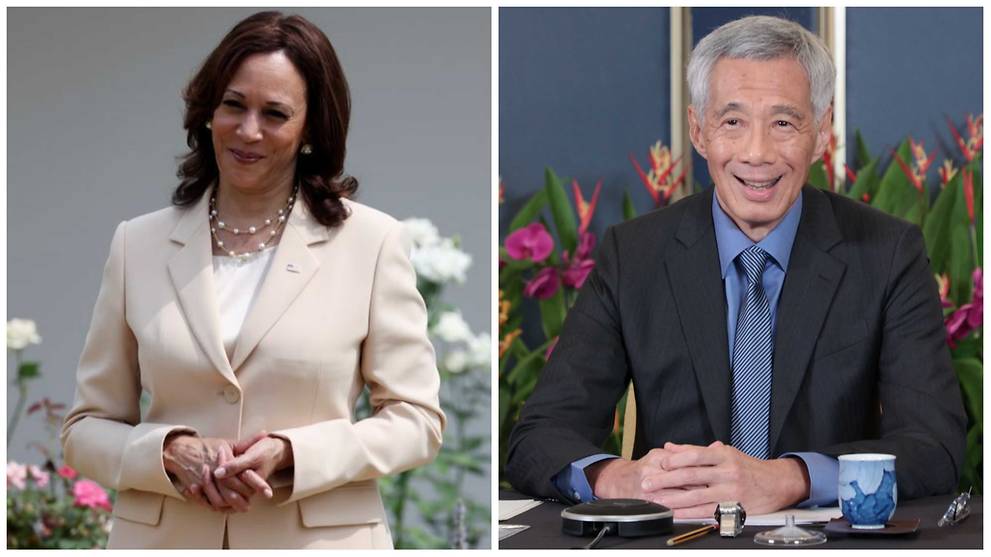
SINGAPORE: United States Vice President Kamala Harris will visit Singapore and Vietnam in a fortnight's time, Prime Minister Lee Hsien Loong said on Tuesday (Aug 3), adding that such high-level visits to the region are "greatly valued".
Ms Harris' visit to Singapore, made at the invitation of Mr Lee, was announced last week. It will be her first official visit to the country.
Singapore is "glad" that the US is "actively visiting" Asia-Pacific countries at a high level, said Mr Lee in his opening remarks at the virtual Aspen Security Forum on Tuesday.
He noted the recent visits of US Secretary of State Antony Blinken and Secretary of Defense Lloyd Austin to Japan and South Korea, as well as Mr Austin's visits to Singapore, Vietnam and the Philippines.
"Such high-level visits are greatly valued. They show that the US is investing the bandwidth and resources in the region, and shows that it has substantial stakes and interests there to protect and advance," said the Prime Minister.
READ: Singapore, US affirm 'vital' American presence in region as defence chiefs meet
"The US has returned to a more conventional approach to foreign policy, a renewed emphasis on multilateralism, and has refocussed on its global network of allies and partners," he added.
"There is a palpable sense of relief not just in the Asia Pacific, but all around the world."
US-CHINA TIES "MORE DIFFICULT"
Turning to US-China bilateral relations, Mr Lee said ties between the two countries have become "more difficult" in the last few years.
"In the US, this is reflected in a deep shift in attitudes towards China, which is bipartisan, and extends beyond the administration and the Congress into the population," he said.
"The same forces constrain and shape the policies of the current US administration towards China, as shaped by the previous administration."
READ: Harris will reject China's claim in the South China Sea during trip to Asia
"In China too, attitudes have become more assertive and robust," said Mr Lee.
China has taken a more active international stance and seeks to "reshape the international order to its advantage", he added.
"I think it will be hard to reverse the present trend towards more troubled relations," said Mr Lee.
"But many countries still hope that the deterioration in the relationship can be checked. Because many US friends and allies wish to preserve their extensive ties with both powers.
"No good outcome can arise from a conflict. It is vital for the US and China to strive to engage each other, to head off a clash which would be disastrous for both sides, and the world."
COVID-19 HAS NOT BROUGHT COUNTRIES CLOSER
Mr Lee also discussed international cooperation during the COVID-19 pandemic. He noted that there has been "some cooperation", such as on vaccine multilateralism and international commerce.
But more broadly, COVID-19 has not brought countries closer together.
"In fact often on the contrary," said Mr Lee. "There was a scramble for critical supplies, like masks and (personal protective equipment), and later vaccines.
"And internationally, the pandemic has spawned recriminations and finger-pointing – where did the virus came from, who is to blame, and so on. Domestically, populations in many countries felt growing anxiety and insecurity, which has fed nativist sentiments."
READ: China rejects WHO plan for COVID-19 origin study, says it 'defies science'
Concluding his remarks, Mr Lee said that while the current mood in the US was not pro-trade, there were many new opportunities for the US to cooperate with the Asia-Pacific region, such as in digital trade and green growth.
"So I hope the US will pursue them, and continue to play a major role in fostering an inclusive, rules-based world order," added Mr Lee.
https://news.google.com/__i/rss/rd/articles/CBMiamh0dHBzOi8vd3d3LmNoYW5uZWxuZXdzYXNpYS5jb20vbmV3cy9zaW5nYXBvcmUvdXMtdnAta2FtYWxhLWhhcnJpcy12aXNpdC1zaW5nYXBvcmUtdmlldG5hbS1wbS1sZWUtMTUzNzI5NzbSAQA?oc=5
2021-08-03 16:07:30Z
52781770950201
Tidak ada komentar:
Posting Komentar